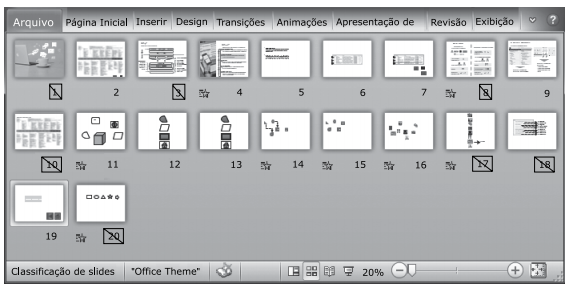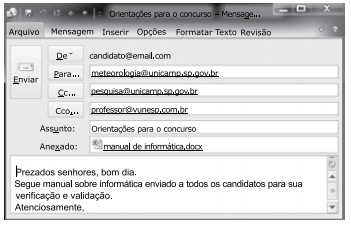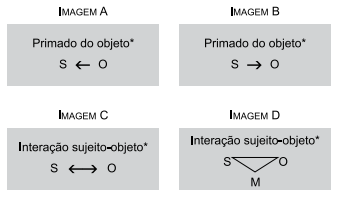Questões de Concurso Público UNICAMP 2019 para Pedagogo
Foram encontradas 60 questões
Na figura a seguir, é mostrada uma apresentação do MS-PowerPoint 2010, em sua configuração original.

No slide 19, foi inserido o botão de ação  (configurado com hiperlink padrão) que, ao ser clicado em modo de exibição
de slides, levará a apresentação para o seguinte slide:
(configurado com hiperlink padrão) que, ao ser clicado em modo de exibição
de slides, levará a apresentação para o seguinte slide:
Considere a mensagem de correio eletrônico digitada no MS-Outlook 2010, na sua configuração padrão, pronta para ser enviada.

Ao receber a mensagem, [email protected]
pretende retransmiti-la apenas para a banca da Vunesp
([email protected]), mantendo o manual de
informática como anexo. Para isso, é necessário o
seguinte procedimento a partir da mensagem originalmente recebida: clicar na opção
A Free Press Needs You
By The Editorial Board
August 15, 2018
In 1787, the year the Constitution was adopted in the USA, Thomas Jefferson famously wrote to a friend, “Were it left to me to decide whether we should have a government without newspapers, or newspapers without a government, I should not hesitate a moment to prefer the latter.”
That’s how he felt before he became president, anyway. Twenty years later, after enduring the oversight of the press from inside the White House, he was less sure of its value. “Nothing can now be believed which is seen in a newspaper,” he wrote. “Truth itself becomes suspicious by being put into that polluted vehicle.”
Jefferson’s discomfort was, and remains, understandable. Reporting the news in an open society is an enterprise laced with conflict. His discomfort also illustrates the need for the right of free press he helped to preserve. As the founders believed from their own experience, a well-informed public is best equipped to root out corruption and, over the long haul, promotes liberty and justice. “Public discussion is a political duty,” the Supreme Court said in 1964. That discussion must be “uninhibited, robust, and wide-open” and “may well include vehement, caustic and sometimes unpleasantly sharp attacks on government and public officials.”
(www.nytimes.com/interactive/2018/08/15/opinion/editorials/free-press-local -journalism-news-donald-trump.html?action=click&module=Trending& pgtype=Article®ion=Footer&contentCollection=Trending. Adaptado.)
A Free Press Needs You
By The Editorial Board
August 15, 2018
In 1787, the year the Constitution was adopted in the USA, Thomas Jefferson famously wrote to a friend, “Were it left to me to decide whether we should have a government without newspapers, or newspapers without a government, I should not hesitate a moment to prefer the latter.”
That’s how he felt before he became president, anyway. Twenty years later, after enduring the oversight of the press from inside the White House, he was less sure of its value. “Nothing can now be believed which is seen in a newspaper,” he wrote. “Truth itself becomes suspicious by being put into that polluted vehicle.”
Jefferson’s discomfort was, and remains, understandable. Reporting the news in an open society is an enterprise laced with conflict. His discomfort also illustrates the need for the right of free press he helped to preserve. As the founders believed from their own experience, a well-informed public is best equipped to root out corruption and, over the long haul, promotes liberty and justice. “Public discussion is a political duty,” the Supreme Court said in 1964. That discussion must be “uninhibited, robust, and wide-open” and “may well include vehement, caustic and sometimes unpleasantly sharp attacks on government and public officials.”
(www.nytimes.com/interactive/2018/08/15/opinion/editorials/free-press-local -journalism-news-donald-trump.html?action=click&module=Trending& pgtype=Article®ion=Footer&contentCollection=Trending. Adaptado.)
A Free Press Needs You
By The Editorial Board
August 15, 2018
In 1787, the year the Constitution was adopted in the USA, Thomas Jefferson famously wrote to a friend, “Were it left to me to decide whether we should have a government without newspapers, or newspapers without a government, I should not hesitate a moment to prefer the latter.”
That’s how he felt before he became president, anyway. Twenty years later, after enduring the oversight of the press from inside the White House, he was less sure of its value. “Nothing can now be believed which is seen in a newspaper,” he wrote. “Truth itself becomes suspicious by being put into that polluted vehicle.”
Jefferson’s discomfort was, and remains, understandable. Reporting the news in an open society is an enterprise laced with conflict. His discomfort also illustrates the need for the right of free press he helped to preserve. As the founders believed from their own experience, a well-informed public is best equipped to root out corruption and, over the long haul, promotes liberty and justice. “Public discussion is a political duty,” the Supreme Court said in 1964. That discussion must be “uninhibited, robust, and wide-open” and “may well include vehement, caustic and sometimes unpleasantly sharp attacks on government and public officials.”
(www.nytimes.com/interactive/2018/08/15/opinion/editorials/free-press-local -journalism-news-donald-trump.html?action=click&module=Trending& pgtype=Article®ion=Footer&contentCollection=Trending. Adaptado.)
O esforço para compreender e definir um campo de conhecimento específico da Pedagogia Universitária tem sido alvo das comunidades acadêmicas em diversos países, e, não diferentemente, vimos no Brasil um avanço e crescimento do interesse em pesquisas nessa área. Várias questões surgem quando se pesquisa uma Pedagogia para a universidade, tais como: existe uma Pedagogia Universitária? O que significa a Pedagogia Universitária?
Quando se considera a docência no ensino superior, uma de suas característica consiste
No ensino superior brasileiro, privilegia-se a técnica da aula expositiva, e ainda não se valorizou adequadamente o uso da tecnologia visando tornar o processo de ensino- -aprendizagem mais eficiente e eficaz.
Como contribuições do uso da tecnologia para a mediação pedagógica nos cursos de formação de professores, podem-se citar
Sobre as teorias do conhecimento, considere os esquemas a seguir:

É correto afirmar que